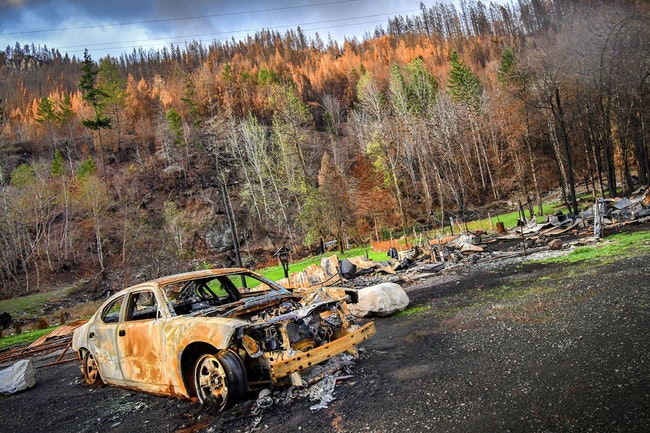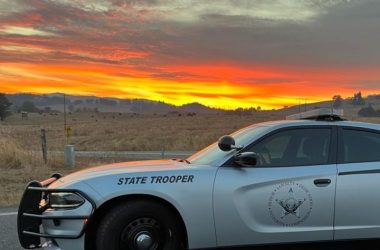
Wildfire in 2020 left damage all throughout the Santiam Canyon east of Salem. (Ron Cooper/Salem Reporter)
WASHINGTON — The federal government should re-examine its emergency response systems to better assist communities at risk from the growing threats of wildfire, state and local wildfire responders told members of Congress Tuesday.
Wildfires across the United States have become larger, more intense and longer-lasting this century in part due to changes in the global climate—creating more demand for federal aid in response to the fires and for mitigation in fire-prone areas.
“Climate change, dangerous fuel accumulations and increased development in the wildland urban interface has caused a significant increase in catastrophic loss of life, property and ecosystems across the United States, most dramatically in the Western U.S.,” Kacey KC, the Nevada State Forester Firewarden, told members of a House Transportation and Infrastructure subcommittee at a hearing.
The hearing comes as Western states recover from another massive wildfire season.
In 2021, more than 48,000 wildfires burned over 6.5 million acres in the United States, according to the National Interagency Fire Center, a government group dedicated to fire management.
That added to the significant toll of wildfires over the past 15 years, as states often see record years for wildfires. Since NIFC started its modern record-keeping of wildfires in 1983, there have been 10 years when 8 million acres or more burned. All of those records occurred since 2004.
“All Western states have seen record-setting wildfires in recent years. Drought conditions have resulted in forests ready to explode—whether from a lightning bolt, errant campfire spark, utility lines being interrupted by trees, or an arsonist’s match,” said Rep. Dina Titus, (D-Nev.), who led the hearing.
The Federal Emergency Management Agency — the federal government’s response arm for disasters — issued five major disaster declarations from fires last year. The agency also provided 33 Fire Management Assistance Grants, its major tool to help states manage land to try to mitigate wildfires before they start.
“It is critical for us to ensure FEMA is positioned to assist those communities to prepare for, mitigate against and recover from wildfires. And it may be very different than what is needed for floods or hurricanes,” said Rep. Daniel Webster, (R-Fla.). “People need to get assistance without costly delays and mountains of paperwork.”
State wildfire recovery experts say FEMA’s help is increasingly necessary, but many of the agency’s programs are slow to respond to the immediacy of fire threats.
For example, KC, the Nevada firewarden, said the state has received $8 million in FEMA wildfire mitigation grants but has not yet been able to start any of the projects, due to the “lengthy application and environmental review process.”
Casey Hatcher, deputy chief administrative officer of Butte County, California, told the committee her county relied on FEMA to recover from the devastating Camp Fire in 2018, the most deadly wildfire in California history. But the agency’s assistance to victims was slow and sometimes confounding.
“Now is the time to learn from recent wildfire disasters and update the federal approach to disaster prevention, response and recovery in wildfire-prone communities,” Hatcher told the subcommittee.
The Camp Fire burned 14,000 residences, nearly 14 percent of the county’s housing stock, but it took nine months for FEMA to set up the first group housing site, according to Hatcher. Once they finally arrived, FEMA’s mobile homes did not meet California building codes for fire safety, so could not be placed in areas affected by the fire or sold to families as a longer-term housing solution.
“The process should not be so difficult for people to get the individual assistance they need,” said Rep. Peter DeFazio, (D-Ore.).
The director of Oregon’s state emergency management agency, Andrew Phelps, said some problems stem from the many layers of oversight built into FEMA programs to try to protect against fraudulent claims.
“We need to step away from this notion that when we are trying to offer assistance to survivors, the first thing…is prevent fraud, the second thing is to prevent an IG [inspector general] investigation and the third thing we are trying to do is help survivors,” said Phelps. “Helping survivors needs to be at the front and center of every decision being made.”
Several bills bearing on federal wildfire response are up for consideration this week in congressional committees. The House Transportation & Infrastructure Committee will vote Wednesday on two.
The committee is expected to approve both measures, but they could face a bigger hurdle to get onto the calendar for the full House or the Senate, where partisan gridlock is holding up many legislative proposals.
The committee will consider the Resilient AMERICA Act, a wide-ranging disaster relief bill. It includes provisions for federal assistance for communities to update building codes, install fire-resistant building materials or create more defensible space around property that is at risk of wildfire. Titus, DeFazio, Webster and Rep. Sam Graves, (R-Mo.), sponsored the bill.
Another bill up for a vote, the Wildfire Recovery Act, would change a cost-share cap in one of FEMA’s fire programs.
It would allow FEMA to spend more on Fire Management Assistance Grants for some devastating fires. Currently, FEMA has a 75 percent cost-share cap for these grants, which help pay for field camp expenses, equipment use and repair and other materials and supplies to fight fires.
Rep. Joe Neguse, (D-Colo.), introduced the bill and has 38 cosponsors, including four Republicans. Witnesses at the hearing said more flexibility for the grants would help in some fire-prone areas.
Neguse also has another bill under consideration that would raise the pay for federal wildland firefighters.
A panel of the House Natural Resources Committee will hear from wildland firefighters and federal officials at a hearing Wednesday to discuss that legislation. Neguse introduced the bill last week with a Republican co-sponsor, Rep. Liz Cheney of Wyoming.
Oregon Capital Chronicle is part of States Newsroom, a network of news bureaus supported by grants and a coalition of donors as a 501c(3) public charity. Oregon Capital Chronicle maintains editorial independence. Contact Editor Les Zaitz for questions: [email protected]. Follow Oregon Capital Chronicle on Facebook and Twitter.
NEWS TIP? Please send an email to [email protected] for our reporters to consider.




